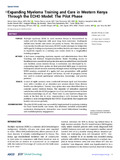Expanding Myeloma Training and Care in Western Kenya Through the ECHO Model: The Pilot Phase

View/
Date
2024-04-04Author
Oduor, Mercy Atieno
Lotodo, Teresa Cherop
Severance, Tyler
Melly, Beatrice Jepngetich
Omondi, Austin
Ndenga, Indagala
Namaemba, Diana Flora
Oyollo, Yvette
Manyega, Kelvin Mogesa
Morgan, Jennifer
Oguda, John
Loehrer, Patrick
Vik, Terry
Metadata
Show full item recordAbstract
PURPOSE Multiple myeloma (MM) in rural western Kenya is characterized by
under and late diagnosis with poor long-term outcomes. Inadequate
skilled rural health care teams are partly to blame. The Extension for
Community Healthcare Outcomes (ECHO) model attempts to bridge this
skills gap by linking rural primary/secondary health care teams (spokes)
to myeloma experts in a tertiary care center (hub) in a longitudinal
training program.
METHODS A hub team comprising myeloma experts and administrators from Moi
Teaching and Referral Hospital/Academic Model Providing Access to
Healthcare was assembled and spoke sites were recruited from rural health
care facilities across western Kenya. A curriculum was developed by incorporating
input from spokes on their perceived skills gaps in myeloma.
Participants joined sessions remotely through virtual meeting technology.
ECHO sessions consisted of a spoke-led case presentation with guided
discussion followed by an expert-led lecture. An end-of-program survey
was used to evaluate participant satisfaction, knowledge, and practice
patterns.
RESULTS A total of eight sessions were conducted between April and November
2021 with a median of 40 attendees per session drawn from diverse
health care disciplines. Twenty-four spoke sites were identified from 15
counties across western Kenya. The majority of attendees reported
satisfaction with the ECHO program (25 of 29) and improvement in their
myeloma knowledge (24 of 29). There were 74 new myeloma diagnoses
made at the hub site in 2021, representing a 35% increase from the
previous 3-year average despite the COVID-19 pandemic that suppressed
health care access globally.
RECOMMENDATIONS The pilot ECHO model was successfully implemented in myeloma training
for rural-based health care teams. Key attributes included collaborative
curriculum development, interactive case–based bidirectional learning,
and multidisciplinary engagement.
Collections
- Staff Collection [24]
